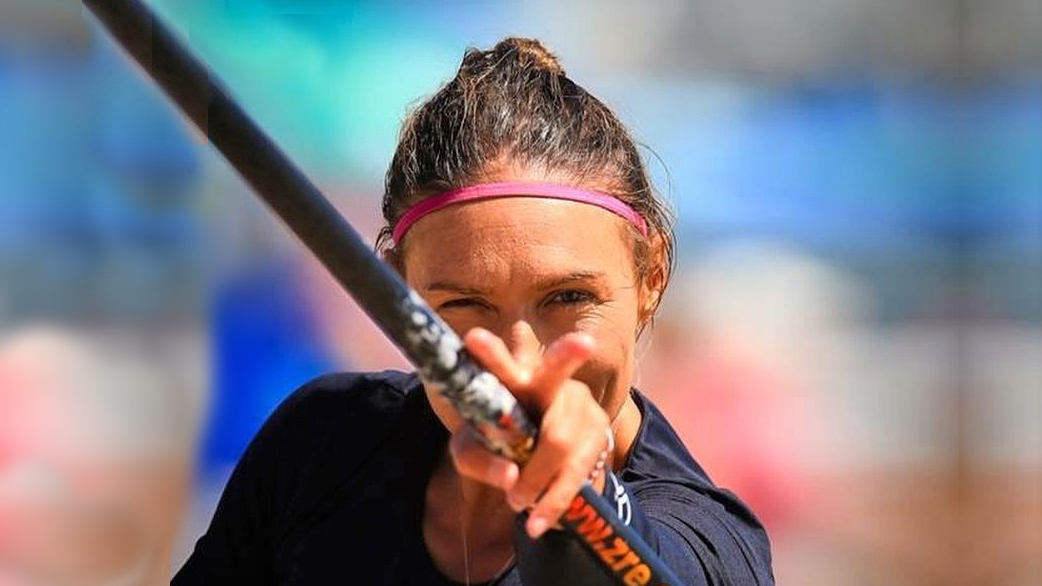
World Number One Takes Hiatus: Injured Annabel Anderson Withdraws from Carolina Cup; Rethinks Remainder of the Season
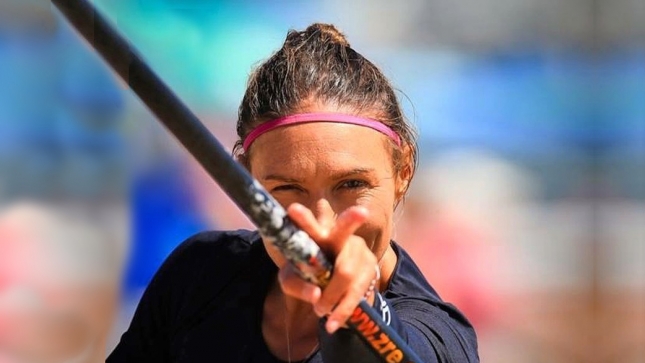 [notdevice] [/notdevice]
[notdevice] [/notdevice]
In an surprise announcement that will probably come as no surprise to those who know her best, world number one Annabel Anderson has revealed she won’t be defending her Carolina Cup title this year, opening up the women’s field at one of the biggest races in the world as the five-time champion takes an indefinite hiatus to recover from injury and re-evaluate her priorities.
Following a career-best season in 2018, where she managed to break her own lofty records and finish the year with an astonishing 300+ points (a number I thought was virtually impossible to achieve when I created the world rankings system — the “Unicorn Club” we call it) while also helping lead the drive for gender equality on the start line, Annabel spent the southern summer chasing her other passion: mountain bike racing at home in New Zealand.
Judging by her Instagram, Annabel doesn’t do anything by halves whether it’s on or off the water, so the fact she suffered a serious injury, while not great to hear, is no surprise to hear.
The tenacious Kiwi suffered a serious injury while racing down a mountain earlier this year (update: Annabel tells me the injury actually happened during a freak training accident at home, not during one of her gnarly crashes while charging down mountains on a bike as we previously stated). In addition to that concussion, the Queen of Carolina has had many niggling injuries throughout her career that have started to catch up — Annabel is scheduled to go under the knife later this month.
Throw in the effort of finding motivation when you’ve won almost every race there is to win, and it all adds up to a hiatus.
Annabel will be sorely missed at Carolina, but the absence of an athlete that had such a stranglehold on this event over the past half a decade will open up interesting new storylines in the women’s sport. And while Annabel was still the undisputed number one and legitimate GOAT contender, several women were working hard to close the gap — the likes of Olivia Piana and Fiona Wylde likely to be the odds-on favourites for this year’s crown.
It’s already been a big news week for one of the biggest events in the sport after Quiksilver Waterman was announced as new title sponsorship of the Carolina Cup yesterday, while The Paddle League is set to beam the race live as part of the new-look world tour that ranks Carolina as one of the true “majors” on the international circuit.
Never short of a strong opinion, Annabel offered her seasoned thoughts on the sport in a wide-ranging interview with Robert Butler from North Carolina Press Release, the official news source of the Carolina Cup. I generally don’t post press releases directly on SUP Racer, but this one is worth reading in its entirety…
Annabel Anderson, World’s Top-ranked Paddler, Taking Hiatus
– Robert B. Bulter, North Carolina Press Release
RALEIGH, NORTH CAROLINA, USA – Annabel Anderson of New Zealand, the fastest and world’s top-ranked standup paddleboard woman each year since 2012, will take a break in early 2018 for surgery to address a “long-term and horrifically painful ailment” and to fully recover from a serious concussion sustained earlier in the year. Anderson disclosed her plans in an interview with North Carolina Press Release to discuss her remarkable 2017 season and the upcoming Carolina Cup (April 18-22).
Undoubtedly one of the greatest athletes of all time in the sport, Anderson won two gold medals in the recent ISA World Standup Paddleboard Championships; is the reigning World SUP Tour Salt Life Champion; Champion of the Pacific Paddle Games; five-time consecutive champion of The Carolina Cup; and ranked overall number-one in the world, the only female to achieve this recognition.
At the top of her game, Annabel Anderson is 85 points ahead of the nearest competitor in the 2017 year-end rankings, amassing over 300 points for the season. Christopher Parker of supracer.com, keeper of the world-rankings, calls Anderson “a work-horse … a tenacious competitor … a battler at heart … winning again, again, and again.” Wrapping a recent article about the top women in the sport, Parker said, “Annabel has pretty much sealed her status as the greatest of all time.”
In the interview, Annabel Anderson talks about her plans, the Carolina Cup, The Graveyard Race, how she maintained her dominance in the sport, the state-of-the-sport, 14-ft. boards for women, equality in the sport, Heavy Water, a glimpse into New Zealand, and more.
INTERVIEW
Annabel, congratulations on FIVE consecutive victories in the Carolina Cup; your string of impressive championships and titles in 2017; and, your #1 ranking in the world! How do you maintain this incredible momentum year-after-year?
“Looking back, 2017 still feels like a blur. There were a lot of curve balls thrown in my direction, I had a lot of things going on outside the sport, yet somehow I managed to take things week by week, to listen to my heart and do what felt right and that worked out pretty well. I think the success of 2017 was largely due to the consistency of performances over the previous seven years of competition. Mentally I’ve had the strength to overcome what ever obstacles that I’ve faced, of which there have been many, to achieve consistency of performance year after year.”
https://www.instagram.com/p/BTP66ZXhyJi/
Reviewing your sports career, what is your proudest moment?
“It’s been my ability to overcome obstacles. To persevere when the odds have been stacked against me, to back myself when I’ve had to, and to be consistent over time.”
What is your career plan for 2018, and will you defend your title and go for number SIX in the Carolina Cup?
“You heard it here first. I will not be defending my title in 2018. I’m 36; I’ve been living away from home 10-plus months a year for close to a decade, I’m recovering from a serious concussion sustained earlier in the year, and have surgery at the end of March for a long-term ailment that has been horrifically painful for a long time. I’ve had my best ever season racing bikes at home, but right now life is telling me to look after my body and give others the opportunity to strive for the top step of the podium at Carolina Cup this year. There is more to life than titles and trophies.”
Do you plan to be on the pro circuit at all in 2018 or after 2018?
“At this point, I will be bypassing Carolina Cup to allow my body the chance it needs to recover fully. From there I’ll take each week and month as it comes. I know exactly what it takes to win at the highest of levels and if I’m not competing, there are many other ways that I can help others work towards their dreams as well. I have a huge amount of amazing opportunities that are on the table and I plan to take the chance to make the most of some of these as the year plays out. I’ll always go with what my head and heart tell me to do. Watch this space!”
From your unique global perspective, what is the ‘state’ of the sport of paddle boarding?
“It’s in a total state of confusion, and outside looking in, it’s more confused than ever. We need to realize that the massive growth of a few years ago is no longer there and we have to give people reasons to paddle, to surf, to go downwind, to run rivers, to participate in events. It’s a natural attrition that the number of events will atrophy, but others will stabilize and strengthen as a result. It’s a natural settling down process and it’s been coming for a while. On the competition side of things, there are a ready and willing group of pro and want-to-be pro athletes and aspiring juniors. The challenge is that there is no definitive pathway to making a career out of the sport, even less so for girls. While both The Paddle League and the APP World Tour both have their merits, time will tell if there is room for both of them and how they may compliment each other. The state of the ISA versus the ICF for governance of SUP is most likely the greatest concern facing the sport right now. The reality is, we need to be brave enough to realize that the sport is established enough to develop it’s own governance structures in the eyes of the International Olympic Committee. But given the history of discord and disagreement that has plagued the higher echelons of the sport for the better part of a decade, this could be wishful thinking. The challenge is for the sport and its participants along with the support of the IOC to independently form a short, mid and long-term strategic plan. Everyone from brands to athletes to events will benefit.”
https://www.instagram.com/p/BdUqD_1lDQ1/
How does it feel and what is it like to be a global role model for men, women, and children?
“It’s a responsibility that I take seriously and have in the back of my mind with what ever I do. First and foremost I’m a lover of sport and the outdoors and if I can use what I’ve done to encourage more people to develop a life-long love of making the most of what’s on their doorstep, then that’s a pretty awesome thing to be able to do.”
Seeking equality in all aspects of life is a global issue for all peoples, especially minority and economic classes and women. Three questions:
Is progress being made in the sport of paddling?
“We are making some progress and it’s not all bad, but we still have a very long way to go when it comes to the offering of similar opportunities that will encourage more junior female athletes to see it as a viable long term athletic career as well as more females being able to commit to more higher level competition. We must also realize that not all women want to compete but to be a part of communities with a common interest.”
“And while it’s amazing to see opportunities open up, girls must realize that just because they are a girl and can stand on a board, it’s one thing to be invited to the table, it is another to be worthy of that invitation. The worst thing that could happen is for girls to be given certain opportunities but not be ready to be put into those situations. But I’m confident the current and next generations of female athletes will accept these responsibilities and rise to the challenge to present the female side of the sport in the best light possible, as many other females have demonstrated in other sports throughout the decades.”
“While some big strides have been made in the paddling world, specifically around the equality of prize money, we still have a long way to go as a sport. My questioning of the lack of invitations extended to girls to compete in the Red Bull Heavy Water event gave us the feedback that in 2017 we simply no longer accept that kind of discrimination. It brought the subject to the fore and caused much-needed conversations that needed to be had.”
“The reality is that until we have transparency of some of these issues and as a society give girls the same opportunities we give boys, we will not make the progress that we are capable of making. I know how little I received as a sponsored athlete from brands in comparison to boys who were of similar stature and it was a fraction of what they received. It’s the conversation no one wants to have and it’s the type of conversation that needs to begin. So until we give girls the same media attention, out-of-competition opportunities, contractual values and focus, we can paint a pretty picture and say it’s ‘equal’ but it’s not and it’s going to take a societal shift to make it happen.”
Any other comments or thoughts about the Heavy Water incident in San Francisco?
“In 2017, who in their right mind thought it was ok to not invite at least some of the top females to this event? The aftermath of Heavy Water was evidence of just how powerfully women can band together to support each other and how society feels about gender discrimination. I’m proud that I had the courage to raise the question and start the discussion that needed to be opened.”
What are your thoughts about 14-foot boards for women in 2018 and how will this affect outcomes?
“The length of boards is somewhat irrelevant to the outcome of the race, as long as everyone is on the same start line with the same length board when the race begins. The only impact will be that longer boards will move slightly faster over the length of the course. If the smaller girls do not have access to 14-foot boards built to their size, I would consider them to be at a disadvantage compared to the larger girls who ‘fit’ the standard 14-foot production boards which are predominantly designed for men.”
“The topic of allowing girls to race on equivalent length 14-foot boards in the 2018 Carolina Cup is a step forward, but must be taken in context of where the industry is. While a marathon length course is most definitely suited to a longer board, most 14-foot production boards are designed for medium to large sized men, which is significantly different compared to the size of a lot of women. Given the lead times of design and production, I don’t think we’ll see 14-foot production boards that truly fit most competitive females emerge until 2019 to 2020. The caveat to this is, I think you will see the majority of the top female contenders ride custom equipment to compensate for this in 2018 while the industry plays catch up on R&D.”
“Given that equipment is a relatively cheap, compared to gear in some other sports that require a lot of equipment and servicing, there are types of racing that suit 12’6, that suit 14’, and suit 14’-plus. Juniors will develop better technique and reduce risk of injury if they ride smaller boards during their developmental years. You wouldn’t give a 100-pound kid Danny Ching’s paddle, so why would you put them on the same board?”
“We need to get our heads around that and look at what are the most appropriate tools to get the job done when it comes to equipment, the type of event, who is riding it, etc. In turn, it will help solidify the structures and pathways of the sport, allow paddlers to plan their quiver along with their development and type of paddling they do. It’s also another way to stabilize the industry and assist in the development of the sport long term.”
Let’s talk about The Carolina Cup, a race you know very well with five consecutive victories. What are your thoughts on the Graveyard course?
“The Graveyard is a true test of a paddler’s skills, both fitness, and mental fortitude. It’s a course that has everything and is notoriously difficult to prepare for. As we have seen over the years, you can’t just have an engine. You have to be the most well-prepared and skilled athlete on race day, not only to conquer the course, but to overcome your competition. Disrespect any of this and you’ll be humiliated on one of the biggest stages of the year. This will be an interesting year to make predictions from the sidelines. In my absence, I predict the women’s race will play out very differently to the previous five editions.”
What do you love and hate about the Graveyard race?
“I never really hated the Graveyard. I loved the challenge of the course, the variety it offered, the changeability of the weather and course direction, and how the race played out every year.”
What are your thoughts about Wrightsville Beach?
“I’ve always enjoyed Wrightsville Beach and the locals that have welcomed me every year. It’s wonderful how the community has embraced The Carolina Cup and come out to support paddlers around the course. I will miss catching up with good friends this year.”
You have traveled to North Carolina from New Zealand and won the Cup five times? Should we travel to New Zealand?
“New Zealand has fast become the top of many people’s bucket lists. It’s an incredibly diverse country and always depends on what people want to see and do. It’s hard to go past the South Island for the majesty of the Southern Alps, alpine lakes, and national parks. New Zealand’s popularity is exponentially increasing, so I would recommend coming outside of peak tourist seasons to have a truly authentic experience. Rent a car, stay in amazing vacation homes, visit national parks and allow yourself a minimum of two weeks to stay and play.”
What are your interests when you’re not paddleboarding?
“My life off the board revolves around the outdoors and sharing these experiences with friends and others. I help mentor a few up and coming sporting rockstars, serve as an ambassador for Stand Up for the Cure, love the chance to share some of the crazy tales of adventures through writing and speaking, and I’ve always loved to cook. I’ve been heli-biking up in the Southern Alps, paragliding, hiking, and in general taking some time to enjoy the scenery and to share it with others.”
Is there anything else you would like to share with your SUP family and fans?
“Never judge a book by its cover, never assume anything, stay true to your values, let your actions speak louder than your words, and remember, it’s not about a race but how you play the game of life.”
Thank you, Annabel, and best wishes for a successful surgery and speedy recovery.
About the Carolina Cup:
The 8th annual Quiksilver Waterman Carolina Cup will draw thousands of spectators and more than 1,000 event participants. Races, clinics, expos, entertainment, and festivities will be in Wrightsville Beach, April 18-22, 2018. All races will begin and end at Blockade Runner Beach Resort, official resort of the Carolina Cup.
Returning races on the 2018 schedule include:
•The Graveyard, a grueling 13.2-mile ocean and flatwater race for the elite and professional paddleboard racers;
•The Money Island Open, a 6.5-mile flatwater race designed for the intermediate to advanced paddler;
•The Harbor Island Recreational, a 3.5-mile flatwater race for first-time to intermediate paddleboarders;
•The popular Kids Race for children 7 to 14.
New to the race schedule in 2018:
•The Longboat Graveyard, a 13.2-mile race exclusively for Elite OC-1, OC-2, Surfski and Double-Ski.
Organized by the Wrightsville Beach Paddle Club, affiliated with the newly formed Paddle League, and sanctioned by the World Paddle Association (WPA), the Cup will attract paddlers from over 20 countries and virtually every state in the nation. Competitors include Olympians, world-record holders, champions, professionals, amateurs, and first-time paddlers. The Carolina Cup is the first race of 2018 on the WPA World SUP Tour, and the second race of the season on the Paddle League World Tour.
World Rankings – Top-12 Women (source: supracer.com)
1. Annabel Anderson, New Zealand
2. Fiona Wylde, USA
3. Olivia Piana, France
4. Terrene Black, Australia
5. Sonni Honscheid, Germany
6. Penelope Strickland, New Zealand
7. Candice Appleby, USA
8. Angela Jackson, Australia
9. Seychelle Webster, USA
10. Annie Reickert, Hawaii, USA
11. April Zilg, USA
12. Amandine Chazot, France
Complete list of world rankings (top 100 men; top 50 women): https://supracer.com/rankings/
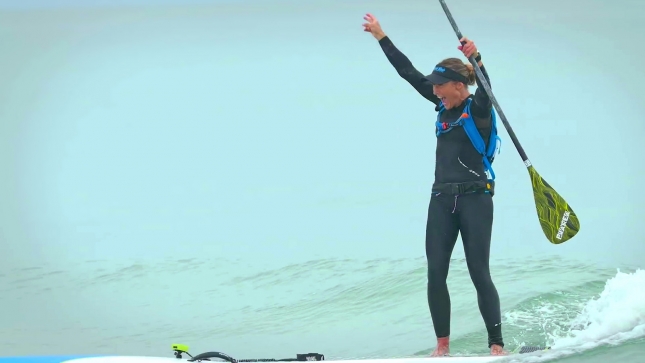
Annabel Anderson celebrating one of her many Carolina titles
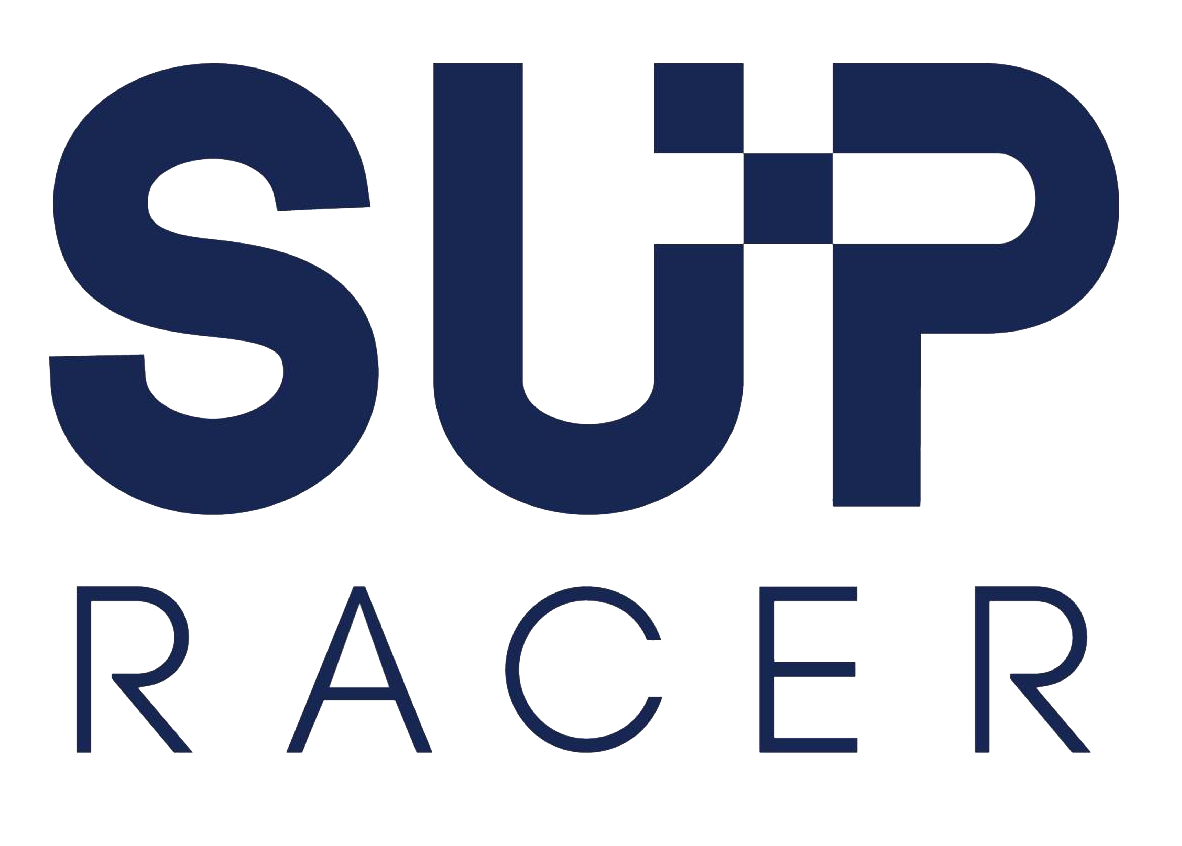


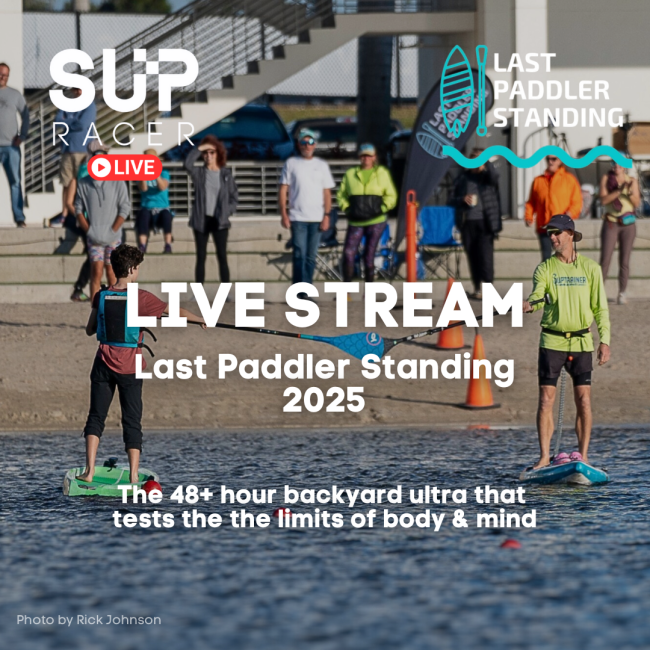
You must be logged in to post a comment.